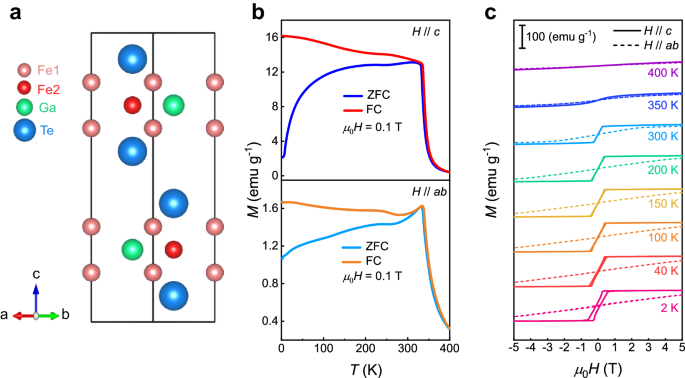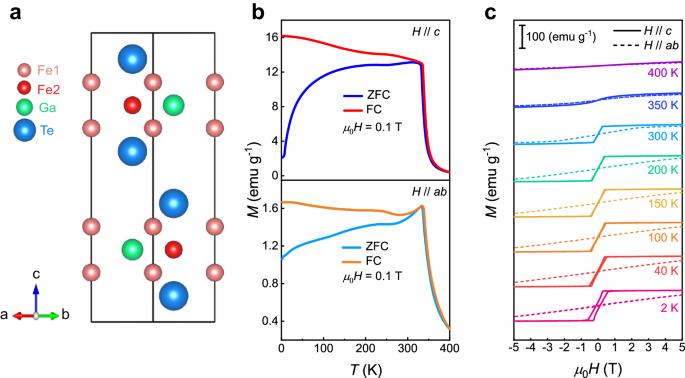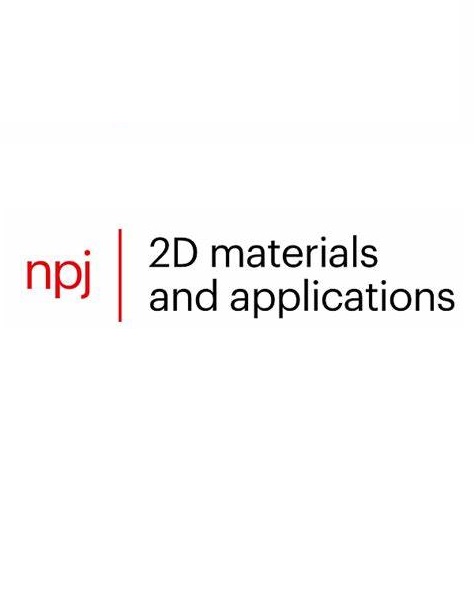范德瓦尔斯 Fe3GaTe2 纳米薄片单层的硬铁磁性
IF 8.8
2区 材料科学
Q1 MATERIALS SCIENCE, MULTIDISCIPLINARY
引用次数: 0
摘要
二维(2D)磁性材料不仅具有基本的科学意义,而且在众多应用领域也大有可为。然而,迄今为止,只有少数几种具有低至二维极限的长阶固有磁体通过实验得到了证实。在这里,我们报告了在范德华(vdW)Fe3GaTe2 纳米片中可以实现低至单层的本征二维铁磁性。通过测量霍尔电阻和磁阻,我们证明了 Fe3GaTe2 单层具有二维硬铁磁性,其固化温度(Tc)达到 240 K,创下了单层已知本征铁磁体的最高纪录。反常霍尔效应(AHE)中近乎垂直跃迁的方形磁滞回线和施加平面外磁场时的负磁阻(NMR)行为都揭示了 Fe3GaTe2 纳米薄片在单层极限下具有强大的垂直磁各向异性(PMA)。此外,我们还发现源于电子带贝里曲率的内在机制在低温范围内主导着纳米片的 AHE。我们的研究结果不仅为下一代自旋电子应用提供了一种极佳的候选材料,还为探索二维铁磁性的物理机制开辟了一个平台。本文章由计算机程序翻译,如有差异,请以英文原文为准。


Hard ferromagnetism in van der Waals Fe3GaTe2 nanoflake down to monolayer
Two-dimensional (2D) magnetic materials are of not only fundamental scientific interest but also promising candidates for numerous applications. However, so far only a few intrinsic magnets with long-ranged order down to the 2D limit have been experimentally established. Here, we report that the intrinsic 2D ferromagnetism can be realized in van der Waals (vdW) Fe3GaTe2 nanoflake down to monolayer. By measuring the Hall resistance and magnetoresistance, we demonstrate that the Fe3GaTe2 monolayer exhibits 2D hard ferromagnetism with record-high Cure temperature (Tc) of 240 K for the monolayer of known intrinsic ferromagnets. Both of square-shaped hysteresis loops with near-vertical jump in anomalous Hall effect (AHE) and the negative magnetoresistance (NMR) behavior with an applied out-of-plane magnetic field reveal robust perpendicular magnetic anisotropy (PMA) in Fe3GaTe2 nanoflakes down to the monolayer limit. Furthermore, we find the intrinsic mechanism that stems from the Berry curvature of electronic bands dominates AHE of nanoflakes in the low temperature range. Our results not only provide an excellent candidate material for next-generation spintronic applications, but also open up a platform for exploring physical mechanisms in 2D ferromagnetism.
求助全文
通过发布文献求助,成功后即可免费获取论文全文。
去求助
来源期刊

npj 2D Materials and Applications
Engineering-Mechanics of Materials
CiteScore
14.50
自引率
2.10%
发文量
80
审稿时长
15 weeks
期刊介绍:
npj 2D Materials and Applications publishes papers on the fundamental behavior, synthesis, properties and applications of existing and emerging 2D materials. By selecting papers with the potential for impact, the journal aims to facilitate the transfer of the research of 2D materials into wide-ranging applications.
 求助内容:
求助内容: 应助结果提醒方式:
应助结果提醒方式:


